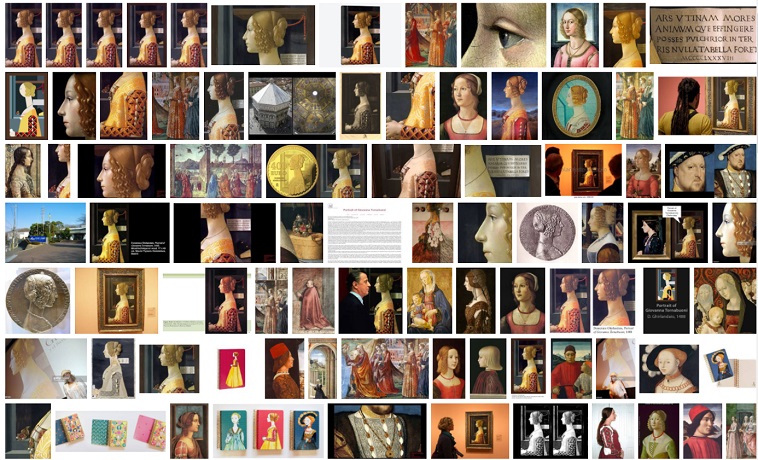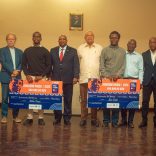Les Percussions de Strasbourg in exchange project with Mozambican artists - Watch
‘Digital Culture and Contemporary Art’ workshops in Maputo: Open call

Photograph: Google search results on the painting by Domenico Ghirlandaio, Portrait of Giovanna degli Albizzi Tornabuoni, 1489-1490 [03.08.2017]
The EUNIC Mozambique cluster – the Camões Portuguese Cultural Centrer in Maputo, the British Council, the Spanish Embassy, the Franco-Mozambican Cultural Centre and the Mozambique-German Cultural Centre – are to hold a seminar on “Digital Culture and Contemporary Art” on 16 April at the Camões Portuguese Cultural Centre in Maputo.
The framework of the seminar includes two workshops entitled “How to follow the track of a work of art on the internet”, conducted in Portuguese by researcher Helena Barranha, and “The Missing Chapter/Black Chronicles: Animating the Past to Imagine the Future”, in English. by curator Renée Mussai.
The workshops are free and have a maximum 10 participants each, selected from the application period from March 19-29. Those interested should send their application to [email protected] with the their full name, contact details and educational qualifications. Indicate which workshop you would like to attend and including a motivating letter.
An outline of the workshops and the CVs of the trainers is available in Portuguese at: www.camoes-ccpmocambique.co.mz
For more information, please contact:
- Camões Portuguese Cultural Centre; Mariana Camarate de Campos – [email protected] / (+258) 21493892 /Av. Julius Nyerere, nº 720, Maputo.
- British Council; Aguinaldo Namburete – [email protected] / (+258) 21355000 / Hollard Building, Av. Sociedade de Geografia, nº 269, Maputo.
Workshop 1 – “How to follow the trail of a work of art on the internet”
Some of the most important works in the history of world art are freely available on the Internet. Converted into digital images, these works of art also exist outside the physical space of museums and printed catalogues, posing new challenges for researchers and curators. Although museums promote the dissemination of their collections through networks, as soon as they are uploaded online, images quickly acquire a life of their own, motivating new interpretations and recreations.
In this context, when searching for a particular work of art on the Internet, we usually find very different results, in which the contents produced by reference institutions coexist with individual appropriations, including blog posts and social networks. In addition to inevitable replicas and trivia, this search often leads to more interesting discoveries, namely to other artistic projects inspired by or derived from the original work.
Based on recent research work, this workshop explores online curation and research tools. Participants will develop a small research project on a painting work, articulating data and images available on institutional platforms with other critical and creative proposals, thus composing a mosaic with different perspectives on the original work.
Workshop 2 – “The Missing Chapter/Black Chronicles: Animating the Past to Imagine the Future”
For small and medium-sized arts organisations, especially non-profit charities, the digitisation of collections represents a number of concomitant challenges: deficiencies in financial and human resources, difficulties with database and file cataloguing systems becoming obsolete in the process, knowledge gaps and continuous change of new technologies and digital policies, to name but a few.
This workshop will provide an opportunity to explore the digital world and analyse some of the difficulties and rewards of file positioning in multidisciplinary and immersive environments, recognising the interwoven existence of digital applications within photo archive collections by curating “image portals” and resources. There will be a practical digital experience using the internet application of “The Missing Chapter”.
Participants will work on developing their own practical responses to a number of key issues:
• What is at stake when we digest historical collections excessively – especially “live” files?
• How is digital access provided, and what are the challenges? What can be “lost the translation”?
• How do these challenges differ when heritage material is related to critical issues of racial politics, representation and the proliferation of counter-files?
• What strategies can we adopt to “liberate” the archival and heritage collections from the confines of museums and galleries?
Biographical Notes:
Helena Barranha graduated in Architecture (FA-UTL, 1995), has a Masters in Cultural Heritage Management (UAlg, 2001) and PhD in Architecture, with a dissertation on Museums of Contemporary Art in Portugal (FAUP, 2008). She is an Assistant Professor at Instituto Superior Técnico, University of Lisbon and Researcher at the Institute of Art History, Faculty of Social Sciences and Humanities at NOVA University in Lisbon, where she is part of the Museum Studies group. She was Director of the National Museum of Contemporary Art – Chiado Museum, Lisbon, from 2009 to 2012, and coordinator of the unplaced project ‘A museum with no place’ (http://unplace.org/), between 2014 and 2015. Its activity professional and research centre focuses on cultural heritage, architecture of contemporary art museums, virtual museums and digital art exhibitions, subjects on which she has carried out several studies and publish both in Portugal and other countries. Helena is a member of the Access to Culture Association of ICOM-Portugal and the Europeana Network Association.
Renée Mussai is Senior Curator and Head of Archive and Research at Autograph ABP, a London-based art charity dedicated to the promotion of photography and film that addresses cultural identity, race, representation and human rights. She is currently an Associate Researcher at the Centre for Research in Visual Identities in Art and Design, University of Johannesburg and a PhD candidate in Art History at University College London. His publications include ‘James Barnor: Ever Young’ (2015); ‘Glyphs: Acts of Inscription’ (2014) with Ruti Talmor; and the forthcoming ‘Black Chronicles’ (2018).













Leave a Reply
Be the First to Comment!
You must be logged in to post a comment.
You must be logged in to post a comment.